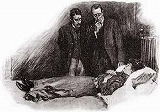
We ascended the stairs and viewed the body. Miss Brenda Tregennis had been a very beautiful girl, though now verging upon middle age. Her dark, clear-cut face was handsome, even in death, but there still lingered upon it something of that convulsion of horror which had been her last human emotion. From her bedroom we descended to the sitting-room, where this strange tragedy had actually occurred. The charred ashes of the overnight fire lay in the grate. On the table were the four guttered and burned-out candles, with the cards scattered over its surface. The chairs had been moved back against the walls, but all else was as it had been the night before. Holmes paced with light, swift steps about the room; he sat in the various chairs, drawing them up and reconstructing their positions. He tested how much of the garden was visible; he examined the floor, the ceiling, and the fireplace; but never once did I see that sudden brightening of his eyes and tightening of his lips which would have told me that he saw some gleam of light in this utter darkness.
“Why a fire?” he asked once. “Had they always a fire in this small room on a spring evening?”
Mortimer Tregennis explained that the night was cold and damp. For that reason, after his arrival, the fire was lit. “What are you going to do now, Mr. Holmes?” he asked.
My friend smiled and laid his hand upon my arm. “I think, Watson, that I shall resume that course of tobacco-poisoning which you have so often and so justly condemned,” said he. “With your permission, gentlemen, we will now return to our cottage, for I am not aware that any new factor is likely to come to our notice here. I will turn the facts over in my mind, Mr. Tregennis, and should anything occur to me I will certainly communicate with you and the vicar. In the meantime I wish you both good-morning.”
It was not until long after we were back in Poldhu Cottage that Holmes broke his complete and absorbed silence. He sat coiled in his armchair, his haggard and ascetic face hardly visible amid the blue swirl of his tobacco smoke, his black brows drawn down, his forehead contracted, his eyes vacant and far away. Finally he laid down his pipe and sprang to his feet.
“It won’t do, Watson!” said he with a laugh. “Let us walk along the cliffs together and search for flint arrows. We are more likely to find them than clues to this problem. To let the brain work without sufficient material is like racing an engine. It racks itself to pieces. The sea air, sunshine, and patience, Watson - all else will come.
“Now, let us calmly define our position, Watson,” he continued as we skirted the cliffs together. “Let us get a firm grip of the very little which we do know, so that when fresh facts arise we may be ready to fit them into their places. I take it, in the first place, that neither of us is prepared to admit diabolical intrusions into the affairs of men. Let us begin by ruling that entirely out of our minds. Very good. There remain three persons who have been grievously stricken by some conscious or unconscious human agency. That is firm ground. Now, when did this occur? Evidently, assuming his narrative to be true, it was immediately after Mr. Mortimer Tregennis had left the room. That is a very important point. The presumption is that it was within a few minutes afterwards. The cards still lay upon the table. It was already past their usual hour for bed. Yet they had not changed their position or pushed back their chairs. I repeat, then, that the occurrence was immediately after his departure, and not later than eleven o’clock last night.